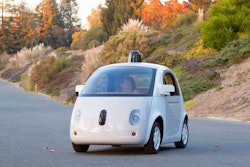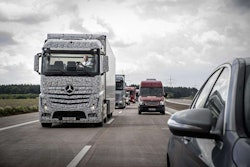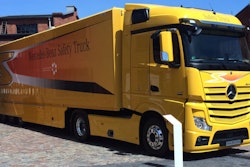![shutterstock_118521220[1]](https://img.ccjdigital.com/files/base/randallreilly/all/image/2015/03/ccj.shutterstock_1185212201.png?auto=format%2Ccompress&fit=max&q=70&w=400)
I don’t usually chit-chat on planes. But I guess all that rarified first class air went to my head: The first mate and I started talking.
He was older than me, and absolutely dripping with gold: big gold chains around his neck. A huge gold Rolex. Rings on his fingers. Even an earring, if memory serves. I’d say his sense of style solidified around the time Saturday Night Fever was in theaters and hadn’t evolved much since. But it was obvious he was very well paid for his gig.
And it was a pretty cool gig, too: He was on his way home from India after spending three months at sea. He’d stay home for a couple months. And when he was ready to go out again, he’d sign a new contract with his company. Then he’d fly – first class, of course – to some exotic port somewhere in the world, meet his ship and then spend another three months at sea. Once the ship reached the final port on his contract (India, this time around), he’d fly home. And the money, he confided, was insane.
I thought of the first mate the other day when I tweeted out a story noting that in the very near future, ocean-going cargo vessels could be completely unmanned and controlled remotely. The article specifically noted that maritime companies could expect huge financial savings, particularly from sailors’ wages.
So, here we have technology rushing to the rescue of — just who, exactly? The fat cats who own fleets of cargo ships sailing around the world?
Being a sailor is a tough job. It can be dangerous. It can be boring. You spend extreme periods far, far away from home, family and friends. That means in order to attract quality people to fill those jobs, you have to pay them extremely well, as my friend the first mate could attest. And paying all those people good money is, apparently, a problem that technology is now going to solve for the maritime industry.
All this sounds familiar to CCJ readers, of course. Because there are many parallels between this technology movement in the marine industry and recent autonomous vehicle developments in trucking. And in both cases, some old concerns about the nature of technology in the workforce are beginning to be talked about again.
The fear of losing one’s livelihood to a machine (or a robot) goes back to the dawn of the Industrial Age. And the concerns about the consequences of too much technology too fast are real – on both sides of the employer-employee equation. And if you’re a truck driver who loves your job, then this week’s musings by Tesla CEO Elon Musk saying that technology will eventually make outlawing human drivers a necessity is certainly bound to give you pause.
About the same time I was chatting with the first mate, I went to China for the first time. I was writing for CCJ’s sister publication, Equipment World at the time. The purpose of the trip was to see how quickly China was moving into the Modern Age and the huge market for construction equipment and technology that was just starting to get going.
At one reception, an executive told me how the Western companies were all clamoring to get into China and sell all the machinery they could. But, he noted, the Chinese government was artificially limiting sales. The reason? Every bulldozer put on a job in labor-intensive China put about 100 men out of work. And that was 100 men who would suddenly have nothing to do but sit around all day and bitch about the government.
The memories of Tiananmen Square were still vividly fresh in China. So obviously, angering massive amounts of citizens who lost their jobs to machinery was something the Chinese leadership was determined to micro-manage to as soft a landing as possible.
Here in the West, we typically don’t worry as much about displaced workers losing their jobs to technology – because usually when one job disappears, new ones open up to support the new way of doing things. That, and we don’t have to deal with the sheer mass of humanity the Chinese do if, say, 5 percent of the population suddenly found themselves out of work thanks to new machines or technology.
What will a “truck driver” do in the future? Daimler suggested last summer while I was on hand in Germany to see the demonstrations of its autonomous truck, that drivers would transition to more of a “transportation manager” type of role. They envisioned this as someone sitting behind the wheel of a truck (because all current laws clearly state that a driverless truck must have a real, live human behind the wheel to take over in case of emergency) who works on his computer dealing logistical issues while the truck cruises down the highway.
Maybe over time that job becomes something like the guys who fly drones for the Air Force today: Someone sitting in a cubical surrounded by computer screens responsible for 10 or 15 self-driving trucks moving around the country.
Meanwhile, common sense tells me we’ll need vast numbers of highly trained technicians with advanced software and computer skills to keep all these high-tech systems operational – not to mention guys and gals who will still have to actually turn wrenches to keep trucks (and ships) – moving.
So my gut tells me the jobs will be there. But that’s not much comfort if you’re already in your 50s, your job is in jeopardy and you’re suddenly faced with learning a whole new skill set that is largely alien to you.
I’m certainly not the first writer to fret about technology stealing jobs. And I’ll admit that I can see both sides of the issue here. On the one hand, I think it’s pretty sorry for a company to eradicate a whole swath of well-paying jobs just because the guys who own the company want to put even more money in their pockets. But guess what? That’s how capitalism works.
On the other hand, truck fleets today are desperate to find drivers. And they’re just not walking through the door anywhere near the numbers this industry needs to operate efficiently. The knee-jerk reaction is always: “Well, then: pay drivers more!” But the driver shortage is just as acute to the best-paying fleets as it is for anyone else. At some point, it seems technology will have to play a role in solving this problem.
The bottom line is this: If all these projected technological changes start hitting our society in the next 10 to 20 years, we could be looking at an alarming shift in terms of gainful employment for large numbers of people. As much as I hate to say so, we might need to borrow a page from China’s playbook and actively manage this employment shift to give people the education and training needed to work and provide for their families in a new, ultra-modern work environment.










